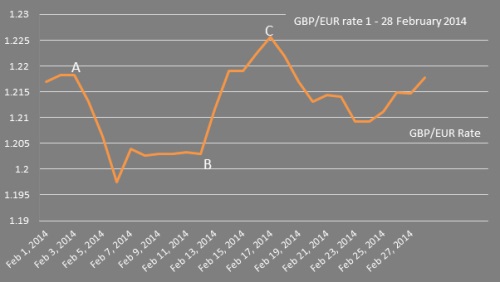Sterling/Euro Currency Review February 2014
Tuesday 11 March 2014
February saw Sterling continue to trade in a tight yet volatile range, and the uncertainty continues, says Ben Scott.
Despite mixed economic data from the UK, leading to a disappointing start to the month for the pound (illustrated by point A on the graph), euro buyers will be largely buoyed by the newfound resilience for Sterling in the face of stuttering economic data.
Sterling traded at an average of €1.2124 throughout February, only briefly dipping below €1.20 when setting the month low of €1.1975 (Interbank throughout) on 6 February 2014.
The GBP/EUR currency pair reached a new 14-month high of €1.2257 on 17 February, the highest level since January 2013. 
Despite data indicating the Eurozone’s economy was once more stagnating against a backdrop of massive unemployment and low inflation, comments from European Central Bank (ECB) President Mario Draghi that the ECB was happy to take a ‘wait and see approach’ before implementing a further interest rate cut was taken as being positive by a market half expecting an interest rate cut from the ECB to 0%.
Meanwhile the British pound started the month firmly on the back foot. A significant drop in manufacturing data combined with a drop in service sector and industrial production figures initially caused Sterling weakness, before concerns of the economic recovery stuttering were compounded by the publication of data showing retails sales figures for December were significantly below forecast.
Despite the shaky start, Sterling gains were re-established (point B) as interest rate speculation once again boosted the pound, despite the ongoing efforts of the Bank of England (BOE). BOE Governor, Mark Carney, introduced new indicators to dampen forecasts of a rate hike when unemployment reaches 7%, whilst maintaining the “UK’s economic recovery was not yet secure”.
The BOE’s upward revision for UK’s economic growth forecasts in 2014, from 2.8% to 3.4%, however, was undoubtedly a Sterling positive, leading to Swiss Bank UBS revising its forecast for the first Bank of England rate hike to Q1/2015, from the previous Q3/2015. If this forecast proves correct the BOE is almost certain to be the first major Central Bank to increase interest rates, which would make Sterling a far more attractive investment, pushing it to 14 month highs.
The announcement of lower than expected inflation resulted in a reversal in GBP/EUR fortunes around point C. Unexpectedly, inflation dropped below the BOE’s target level of 2% in January coming in at 1.9%, falling below target levels for the first time in four years. Although lower inflation is likely to have a positive effect on the pound in the medium term - lower inflation will lower input costs making UK export more attractive. The immediate impact of lower inflation was negative on Sterling, as lower inflation removes any lingering pressure on the BOE to hike interest rates this year.
Meanwhile, disappointing manufacturing data from Germany added to concerns of a sluggish economic recovery Eurozone-side, whilst a depressing business survey again underlined the fragile economy. Nevertheless any euro weakness failed to halt Sterling’s decline as a surprise raise in unemployment shocked the markets after recent positive readings.
Outlook
Whilst the UK’s short-term economic outlook continues to improve, numerous factors will determine the direction of GBP/EUR rates. Concerns grow surrounding the impact that the Scottish independence vote may have on the UK’s economy, with UK Prime Minister David Cameron warning that “Scottish Independence would jeopardise UK’s stability”.
Mixed data from the UK continues to provide uncertainty. Despite indications of certain sectors of the UK economy slowing down, Sterling is likely to be buoyed by far better than expected government borrowing figures and construction activity figures, which reached the best level since August 2007.
Similarly, Eurozone economic data and sentiment was mixed, with Eurogroup chief, Dijjselbloem, claiming that the “euro area is showing signs of recovery but growth levels are still very poor”.
Although concerns remain surrounding the economic performance of France, improved data from other European countries largely eased the pressure on the ECB to cut interest rates to 0%; a direct contrast to speculation that the ECB was set to cut interest rates in an effort to boost economic output. Another rate cut is likely to prove extremely detrimental to the euro.
Ben Scott
Foreign Exchange Ltd
www.fcexchange.co.uk
Next Article: Local Taxes in France 2013
Thank you for showing an interest in our News section.
Our News section is no longer being published although our catalogue of articles remains in place.
If you found our News useful, please have a look at France Insider, our subscription based News service with in-depth analysis, or our authoritative Guides to France.
If you require advice and assistance with the purchase of French property and moving to France, then take a look at the France Insider Property Clinic.





